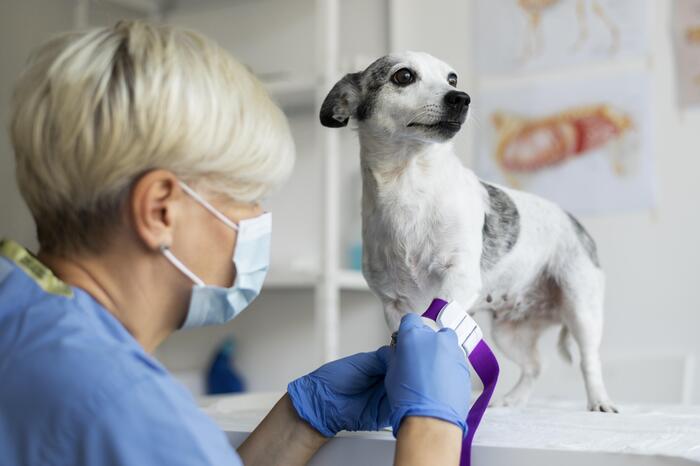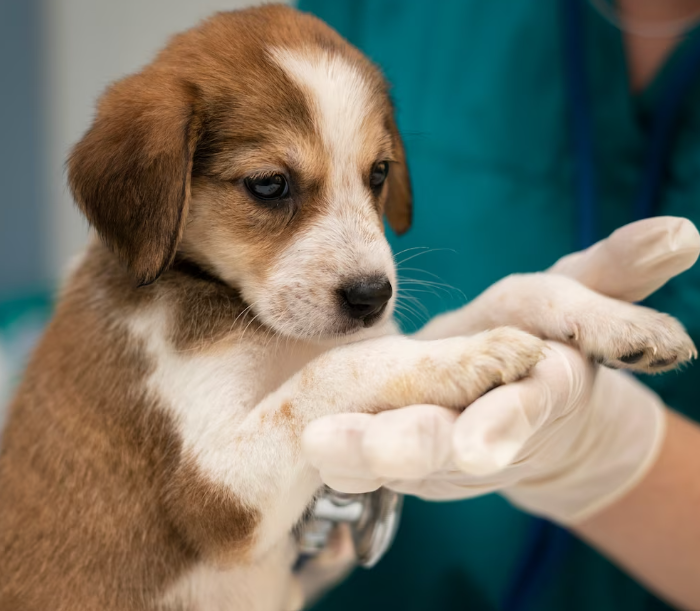2024-07-30
Taking your dog or cat to the vet for regular examination is a part of the process of raising a pet. In best case scenarios, these visits are routine, and their purpose is to confirm that your beloved furry friend is healthy.
In other cases, these visits are rather unpleasant as they are needed due to an illness, or an accident that your pet may have faced.
Some of these visits may be accompanied by running blood tests. Although undergoing a blood test may not be your paw friend’s favorite procedure in the world, it can give the vet a helpful insight into your pet’s health condition and help them prescribe proper treatment.

Our pets communicate to us their emotions, needs and potential health issues through their body language and vocalization.
Sometimes, the way they express how they feel, may be very subtle, or vague, which can make it difficult for us to understand if there is something wrong. Moreover, the strong survival instinct of dogs and cats may prevent them from clearly displaying any signs of vulnerability.
Even if we know our pets as individuals very well, and can recognize any deviations from their typical behavior, we still will be unable to accurately identify the exact reason for these deviations.
This is especially valid for signs of lethargy, loss of appetite and irritation, that may be caused by different factors, including an underlying health condition.
Blood tests provide helpful information on how specific organs and the immune system of our canines and feline friends work, and show if there is an illness. If there is an underlying health condition, they help keep track of its development.
Moreover, science develop quickly which facilitates the taking even closer look into genetics and some genetically-based diseases that may have been inherited.
The kidneys, the pancreas, and the liver are among the organs whose functioning can be examined via a blood test. Levels of certain hormones and electrolytes can also be checked with the help of a blood test.

Blood tests can be administered either as a part of a routine examination or as a component of healthcare that enables veterinarians to identify and address any concerns you may have in regard to your pet’s health.
Regular wellness exams for your pet may include blood tests as part of the overall health assessment. These tests can help the vet identify potential health issues in a timely manner and monitor the overall health of your pet.
Before undergoing surgery or anesthesia, your veterinarian may administer blood tests for your pet to assess their organ function and overall health status. This helps ensure that your pet can safely undergo the procedure.
If your pet is showing signs of illness or not feeling well, blood tests can be administered as a part of the process of diagnosing the underlying problem. They can provide valuable information about organ function, infection, inflammation, and other health indicators.
During the process of aging, our beloved paw friends become more prone to various health issues. Regular blood tests for senior dogs and cats can be needed to monitor their organ function and detect age-related conditions such as kidney disease, diabetes, and thyroid problems.
For pets that are on long-term medication, blood tests may be needed periodically. They will help monitor the medication's effectiveness and ensure that it is not causing any side effects on your pet's organs.
If your pet has a chronic condition, like diabetes or hyperthyroidism, blood tests may be necessary to assess how well the condition is being managed. The results of the tests will help the veterinarian adjust the treatment accordingly.
In some cases, your pet’s veterinarian may recommend screening blood tests for specific diseases or conditions that your pet may be predisposed to, based on their age, breed, age and lifestyle.
How Are Blood Tests Run?
Usually, the procedure is very simple and includes the following steps:
1. The vet will shave a small patch of fur on the body where blood will be taken from;
2. After that they will take a blood sample by using a small needle that will be inserted into the pet’s vein.
In most cases, sedation is not needed, as dogs and cats can endure this level of discomfort. However, if your pet seems to not tolerate this, mostly out of fear and not because it is so painful, fasting may be required.
Your veterinarian will give you advice on what to do to prepare your paw friend for the blood test.

Based on the test, it may take no longer than an hour or between one and two weeks if the samples need to be forwarded to an external lab.
Based on the type of the test, your pet may need to go on a fast for a different period of time-usually between 6 and 12 hours.
This is needed to break down lipemia (an abnormally large amount of fat in the blood) which can affect the results.
Exercise before a blood test, can lead to dehydration, which can lead to changes in the concentration of blood components such as proteins and electrolytes.
Moreover, exercise can cause release of cortisol (stress hormone), which can affect different blood parameters, including liver enzymes, glucose and white blood cells.
Intensive exercise can also lead to temporary muscle damage, which can cause releasing muscle enzymes such as creatine kinase which can affect some results like those concerning liver functioning.
Levels of hemoglobin, hematocrit and hormone levels can also be affected by intensive exercise.
It is important that you try to make your pet feel as comfortable and calm as possible. You can bring their favorite toy, your T-shirt or a soft plush blanket to make the environment more cozy.
Use a calm and soothing voice to talk to your pet and try to distract them with a treat or toy to create a positive experience.
You may want to consider bringing a carrier in case your dog or cat is frightened and may want to run away.
If there are a lot of people at the vet’s office, consider waiting outside or in your car to reduce exposure to stimuli.
Do not forget to keep your pet hydrated, especially in the hot season. Hydration is crucial for pets and fasting does not include restrictions on the water intake.
Of course, you should always consult with your pet’s veterinarian for more detailed information and guidance.
Another important thing to remember is to always have your pet under control. If you have a canine, do not forget to put a leash on them to prevent them from jumping on other people and their animals at the vet’s office, excessively sniffing around or running away.

Costs will vary of course, based on the clinic /laboratory and your pet’s condition. Standard blood work typically costs around $100-$200. Blood tests for pets play an essential role in maintaining their health and well-being. By providing veterinarians with important information about the health and well-being of our dogs and cats, blood tests enable early detection of diseases and underlying conditions that may not be evident through physical examination alone. This early detection contributes to prescribing more effective treatments, better managing chronic conditions, and helping our pets lead a higher quality of life.